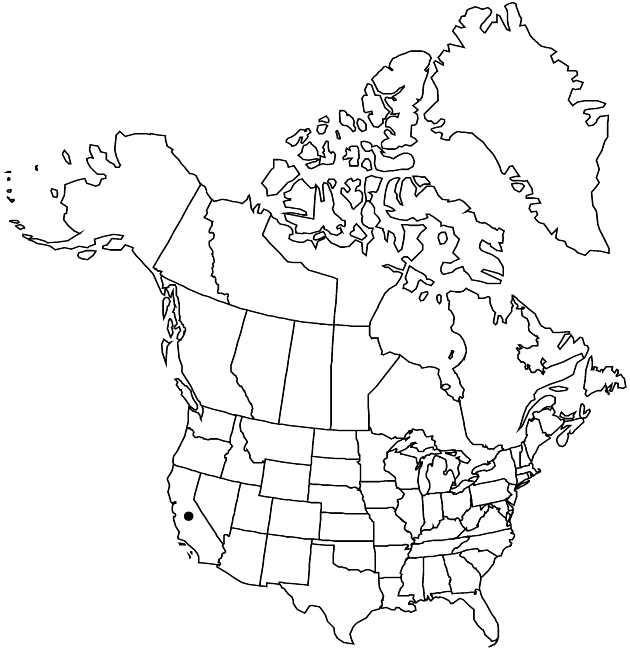Difference between revisions of "Deinandra arida"
Novon 9: 467. 1999.
FNA>Volume Importer |
imported>Volume Importer |
||
| (5 intermediate revisions by 2 users not shown) | |||
| Line 7: | Line 7: | ||
|year=1999 | |year=1999 | ||
}} | }} | ||
| − | |basionyms={{Treatment/ID/ | + | |special_status={{Treatment/ID/Special_status |
| + | |code=E | ||
| + | |label=Endemic | ||
| + | }}{{Treatment/ID/Special_status | ||
| + | |code=C | ||
| + | |label=Conservation concern | ||
| + | }} | ||
| + | |basionyms={{Treatment/ID/Basionym | ||
|name=Hemizonia arida | |name=Hemizonia arida | ||
|authority=D. D. Keck | |authority=D. D. Keck | ||
| + | |rank=species | ||
| + | |publication_title=Aliso | ||
| + | |publication_place=4: 109. 1958 | ||
}} | }} | ||
|synonyms= | |synonyms= | ||
| Line 36: | Line 46: | ||
-->{{#Taxon: | -->{{#Taxon: | ||
name=Deinandra arida | name=Deinandra arida | ||
| − | |||
|authority=(D. D. Keck) B. G. Baldwin | |authority=(D. D. Keck) B. G. Baldwin | ||
|rank=species | |rank=species | ||
| Line 46: | Line 55: | ||
|habitat=Washes, edges of springs and seeps, and adjacent slopes, cliffs, or ledges, often in ± alkaline, sandy, gravelly, or clayey soils | |habitat=Washes, edges of springs and seeps, and adjacent slopes, cliffs, or ledges, often in ± alkaline, sandy, gravelly, or clayey soils | ||
|illustrator=Bee F. Gunn | |illustrator=Bee F. Gunn | ||
| + | |illustration copyright=Flora of North America Association | ||
|elevation=600–1000 m | |elevation=600–1000 m | ||
|distribution=Calif. | |distribution=Calif. | ||
| Line 51: | Line 61: | ||
|publication title=Novon | |publication title=Novon | ||
|publication year=1999 | |publication year=1999 | ||
| − | |special status= | + | |special status=Endemic;Conservation concern |
| − | |source xml=https:// | + | |source xml=https://bitbucket.org/aafc-mbb/fna-data-curation/src/2e0870ddd59836b60bcf96646a41e87ea5a5943a/coarse_grained_fna_xml/V19-20-21/V21_688.xml |
|tribe=Asteraceae tribe Heliantheae | |tribe=Asteraceae tribe Heliantheae | ||
|subtribe=Asteraceae (tribe Heliantheae) subtribe Madiinae | |subtribe=Asteraceae (tribe Heliantheae) subtribe Madiinae | ||
Latest revision as of 20:13, 5 November 2020
Annuals, 20–80 cm. Stems ± solid. Leaves: proximal blades toothed to entire, faces hispid-hirsute and stipitate-glandular. Heads in paniculiform arrays. Bracts subtending heads usually not overlapping each involucre. Phyllaries ± evenly stipitate-glandular, including margins and apices, with non-glandular, non-pustule-based hairs as well. Paleae in 1 series. Ray florets (4–)8(–10); laminae deep yellow, 5–7 mm. Disc florets 17–25, all or mostly functionally staminate; anthers yellow or brownish. Pappi usually 0, rarely of 1–5 linear to setiform scales 0.1–0.6 mm. 2n = 24.
Phenology: Flowering Apr–Nov.
Habitat: Washes, edges of springs and seeps, and adjacent slopes, cliffs, or ledges, often in ± alkaline, sandy, gravelly, or clayey soils
Elevation: 600–1000 m
Discussion
Of conservation concern.
Deinandra arida is known only from Red Rock and Last Chance canyons and associated tributaries in the El Paso Mountains, western Mojave Desert. Depauperate specimens resemble D. kelloggii, which also has been documented from the Red Rock Canyon area.
Selected References
None.
